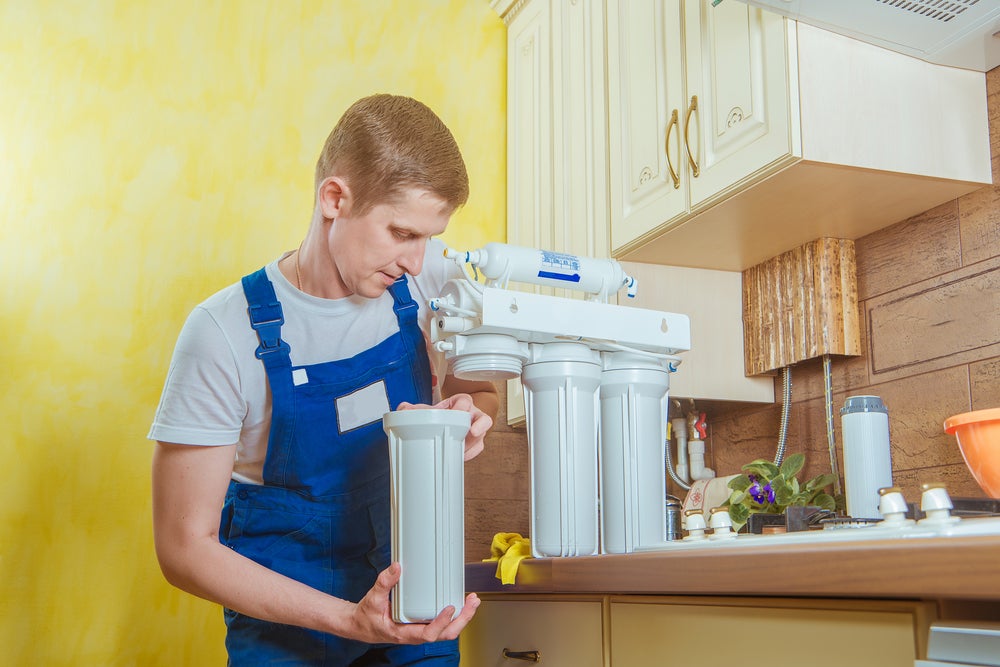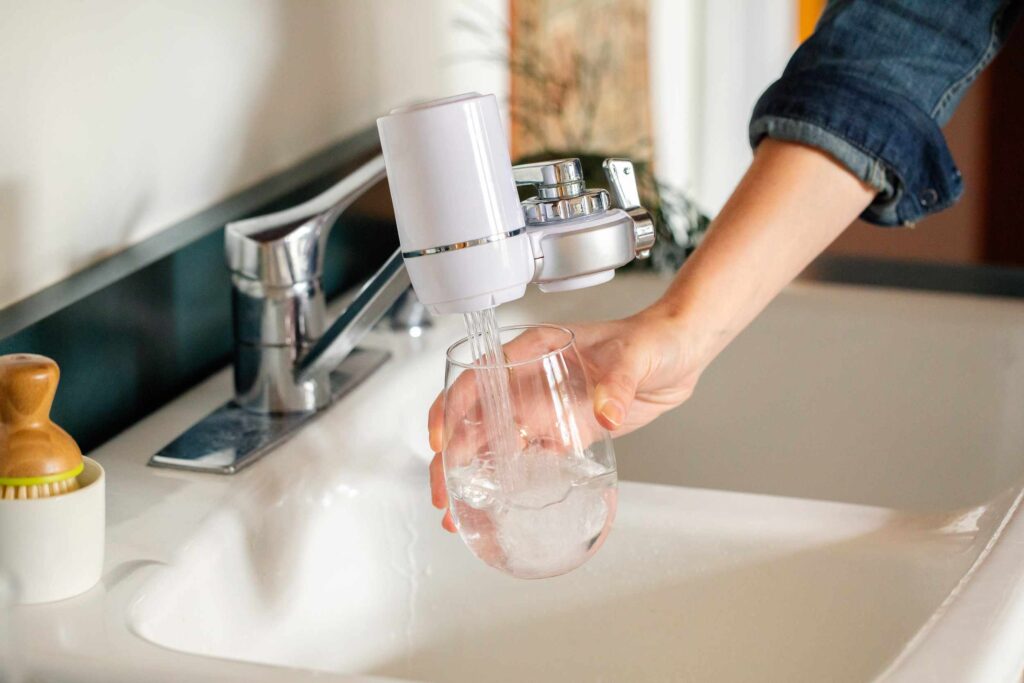Are you thinking about buying a water filter but not sure what’s the return on investment for water filters? Can a water filter really save you money in the future?
Find out the financial advantages of using a water filter at home and how it could potentially increase the value of your property. This article examines the return on investment for water filters and provides a detailed analysis of their worth.
Return on Investment for Water Filters
Is investing in a water filter worth the cost?
Yes, investing in a water filter can be worth the cost, as it provides access to clean and safe drinking water, potentially improving health and reducing the need for bottled water.
Investing in a water filter is a good idea as it can improve the quality of your drinking water. The effectiveness of water filters can vary depending on the brand and type.
When comparing different filter brands, look for affordable options that still offer the benefits of filtered water. Although there’s an initial cost, investing in a water filter can save you money in the long run by reducing the need for bottled water and potential health problems caused by unfiltered water.
How long does it take to see a return on investment with a water filter?
It usually takes about six months to start seeing a return on investment with a water filter, but the savings over time make it worth it.
To figure out how long it will take to recoup your investment, you need to do a cost savings analysis. This involves considering the lifespan of the water filter and the cost of different types of filters.
By comparing the financial benefits of filtered water with the initial cost, you can determine the payback period.
This analysis will help you make an informed decision about whether or not to invest in a water filter.
Can a water filter save me money in the long run?
Yes, a water filter can save money over time by reducing the need for bottled water and potentially lowering medical expenses related to poor water quality.
A water filter can help you save money in the long run. It reduces the need to buy bottled water and can prevent health issues associated with unfiltered water.
Water filter maintenance costs vary depending on the brand, but they’re generally affordable compared to buying bottled water regularly. Using a water filter also helps the environment by reducing plastic waste.
Clean filtered water can prevent health problems, potentially saving you money on medical expenses. Additionally, a water filter can save you from expensive plumbing repairs by preventing the buildup of contaminants in your pipes.
In addition to saving money, investing in a water filter can also offer numerous health benefits of clean water. It ensures that your drinking water is free from harmful contaminants.
What are the financial benefits of using a water filter at home?

Using a water filter at home can help you save money on your monthly water bill and avoid the expenses of buying bottled water. The financial benefits of using a water filter can be significant in the long run.
Moreover, filtering your water has health advantages as it eliminates impurities and enhances the overall quality of the water.
Additionally, using a water filter reduces the environmental impact caused by plastic bottle waste.
It’s important to consider maintenance costs when calculating the return on investment for a water filter.
We delved deeper into the water filters benefits to understand how they can provide a substantial return on investment for your household.
Do water filters increase the value of a home, providing a return on investment?
Yes, a water filtration system can increase home value, potentially providing a return on investment when selling the property.
Installing a water filter in your home can increase its value and provide a good return on investment. Keeping the water filter well-maintained ensures that it works efficiently and lasts longer.
In addition to the financial benefits, water filters also offer environmental and health advantages. They improve the quality of water, which leads to a decrease in the use of disposable plastic bottles and promotes a healthier lifestyle.
While the installation cost may vary, the long-term benefits of having a water filter are more significant than the initial investment.
Are there tax incentives or rebates for installing water filters that help with ROI?
Some regions offer incentives or rebates for water filter installation, which can contribute to the ROI.
Adding water filters to your home can lead to savings by reducing water usage and improving water quality. You can assess the financial advantages of installing water filters by conducting a cost effectiveness analysis.
Additionally, you can explore if there are any tax incentives or rebate programs available to further enhance the cost effectiveness of this investment.
Furthermore, you might not have realized that a water filter can even act as a valuable skincare filter. Clean water can lead to healthier skin by reducing exposure to impurities.
How does the ROI of different types of water filters compare?
ROI varies based on the type of water filter, initial cost, maintenance, and the local water quality.
To compare the ROI of different water filters, you should assess their effectiveness and cost, and then choose the most suitable option for your requirements.
Begin by conducting a cost comparison to determine the initial purchase price and ongoing maintenance expenses. Additionally, analyze the effectiveness of each filter in terms of their ability to eliminate contaminants and enhance water quality.
Take into account the health advantages of filtered water as well as the environmental impact of each filter option.
What factors should I consider when calculating the ROI of a water filtration system?
Consider initial cost, maintenance, water quality improvement, healthcare savings, property value increase, and potential incentives or rebates.
When calculating the ROI of a water filtration system, there are a few important factors to consider. First, you should take into account the initial investment required to purchase and install the system. Additionally, think about the ongoing savings that can be achieved by reducing the need to purchase bottled water. Another factor to consider is the potential reduction in healthcare costs that may result from consuming cleaner and healthier water.
It is also important to consider the quality and longevity of the filtration system. A high-quality system that’s built to last will provide greater long-term savings. Additionally, think about the maintenance requirements of the system. Some systems may require more frequent filter replacements or other maintenance tasks, which can affect the overall cost.
To accurately calculate the ROI, be sure to include the cost of installation, replacement filters, and any other expenses related to maintenance. By carefully considering these factors, you’ll be able to determine the true ROI of your water filtration system.
Can a water filter pay for itself through reduced bottled water expenses?
Yes, a water filter can pay for itself by eliminating the need to purchase bottled water regularly.
Investing in a water filter can help you save money by cutting down on your bottled water expenses. Not only does it save you cash, but it also has other advantages.
A water filter is eco-friendly since it reduces the need for plastic bottles. It also improves the taste of tap water by eliminating impurities and provides health benefits.
Moreover, having clean and filtered water readily accessible is incredibly convenient. Additionally, water filters have minimal impact on plumbing and are a cost-effective alternative to other water sources.
For those aiming for a healthier lifestyle, our discussion wouldn’t be complete without mentioning the potential of a water filter system for weight loss. Access to clean, filtered water can support your weight management goals.
Are there studies or data available on the ROI of water filters?

Yes, various studies and data are available to help assess the ROI of water filters based on specific circumstances.
There are many studies and data available on the return on investment (ROI) of water filters, which provide useful information for consumers.
These studies analyze the financial aspects of water filters and how cost-effective they can be, leading to potential savings.
Investing in a water filter has clear economic benefits as it can help lower expenses related to buying bottled water.
Is a water filter a good investment?
Yes, a water filter can be a good investment for improved health, convenience, and potential financial savings.
Are you thinking about buying a water filter to save money and improve the quality of your drinking water?
A water filter helps the environment by reducing the need for plastic bottles. It also saves you money on medical expenses by removing harmful contaminants.
Moreover, a water filter enhances the taste and overall quality of tap water, making it better for you. It also prevents mineral buildup, extending the lifespan of your appliances.
Overall, investing in a water filter is more cost-effective than buying bottled water in the long run.
Does a water filtration system add value to your home?
Yes, a water filtration system can increase your home’s value, contributing to a return on investment.
Have you thought about how a water filtration system can increase your home’s value over time? Installing a water filtration system not only improves your health but also benefits the environment.
By enhancing water quality, you can raise the overall value of your property. Moreover, the maintenance costs for water filters are low compared to the long-term benefits they provide.
Don’t ignore the potential value and advantages that a water filtration system can bring to your home.
What is the return on investment for a water softener?
The ROI for a water softener depends on factors like the water hardness, initial cost, and maintenance expenses.
Are you aware that investing in a water softener can provide significant returns in terms of energy bill savings and the lifespan of your appliances?
By reducing mineral deposits, a water softener improves efficiency and decreases energy consumption, resulting in cost savings on your energy bills.
Moreover, it also extends the lifespan of your appliances by preventing mineral buildup, offering additional financial advantages and economic benefits.
What is a good ROI percentage?
A good ROI percentage varies by individual circumstances but generally signifies that the investment provides more value than the cost incurred.
Do you know what percentage is considered a good ROI for water filter investments?
Calculating ROI is important for determining profitability and evaluating investment potential. When analyzing financial returns, it’s crucial to assess investment viability.
For water filter investments, a good ROI percentage will usually depend on factors such as initial investment costs, ongoing maintenance expenses, and the expected lifespan of the filter system. Thoroughly assessing these factors will help determine a suitable ROI percentage for water filter investments.
Wrapping Up: Return on Investment for Water Filters
Investing in a water filter is a smart financial choice. It can save you money in the long term, boost your home’s value, and ensure clean and safe water.
A water filter generally offers a good return on investment with a high ROI percentage.
All in all, a water filter is a valuable addition to any home.

